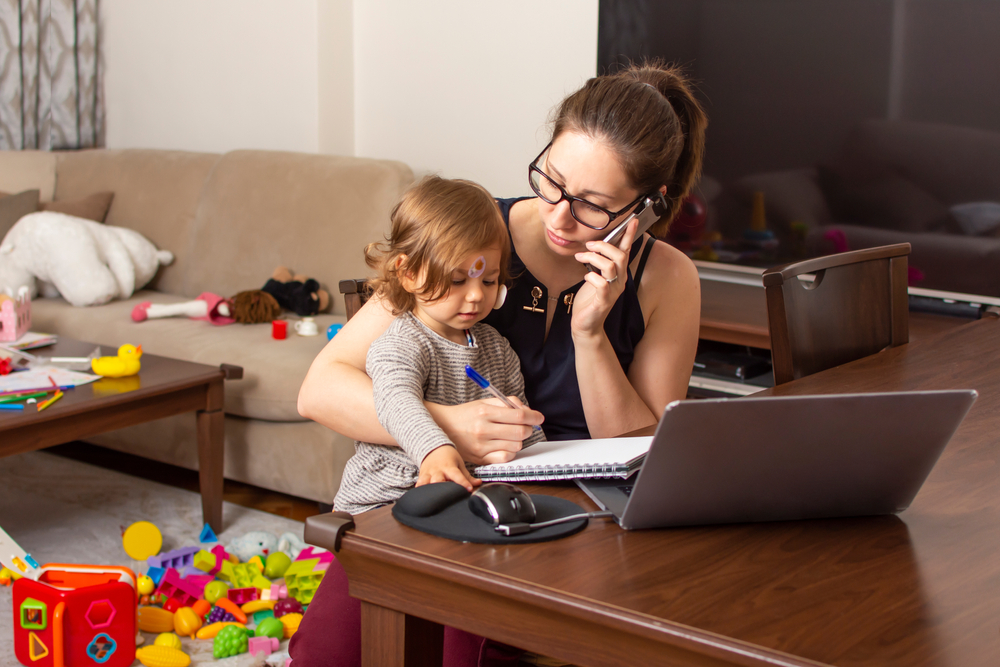These findings are part of ongoing LeanIn.Org and SurveyMonkey research on how COVID-19 is affecting women’s finances, job security, home life, and overall well-being. For more information and results, visit this page.
Women are shouldering a much heavier burden of household labor and caregiving during Covid-19, and it’s taking a toll — they’re experiencing physical symptoms of stress and burnout at up to twice the rate of men. Our findings also indicate that employers are providing limited support for employees who are trying to manage increased responsibilities at home during the pandemic.
Women are experiencing symptoms of severe stress and burnout during the pandemic.
Women are more than twice as likely as men to be experiencing physical symptoms of severe anxiety, such as a racing heartbeat (25% vs. 11%). More than half (52%) of women are having sleep issues, compared to about a third (32%) of men. And women who work full-time and have partners and children are more than twice as likely as men in the same situation to feel that they have more to do than they can possibly handle (31% vs. 13%).
Women feel overwhelmed because they’re shouldering a heavier workload
Among women and men who have full-time jobs, partners, and children, women are spending an average of 7.4 more hours per week than men on childcare (39.8 hours vs. 32.4 hours), and 5.3 more hours caring for elderly or sick relatives (10.4 hours vs. 5.1 hours). Most women are also spending at least 7 more hours than men on housework (57% of women are spending 21 hours or more, while 60% of men are spending 14 hours or less). That adds up to a difference of almost 20 hours per week — the equivalent of a part-time job.
The burdens of housework and caregiving are even heavier for women of color and single mothers
Latinas and Black women are spending far more time on housework than white women (more than 75% of Latinas and Black women are spending 21 or more hours per week, compared to 55% of white women). Latinas and Black women are also spending an average of 4 to 12 more hours per week on childcare than white women, and 15 to 20 more hours per week caring for elderly or sick relatives.
Similarly, single mothers are spending more time on housework than women overall (81% of single mothers are spending 21 or more hours per week on housework, compared to 62% of women overall). Single mothers are also spending an average of 7 more hours per week on childcare than women overall, and 16 more hours per week caring for elderly or sick relatives.
Most employees are not receiving significant support from their employers
Only 41% of employees say that their employer has changed policies to allow more flexibility during the pandemic, and just 18% say their company has reduced their scope or adjusted their priorities. Less than a third (31%) say a manager or HR staff member is checking in on their well-being. These numbers are only slightly better for employees who are able to work from home (52%, 18%, and 41%). Among people working outside the home as essential workers, 36% say their employer is allowing more flexibility, 16% say their scope or priorities have been adjusted, and only 24% say that a manager or an HR staff member is checking in on their well-being.
Survey methodology
These findings from LeanIn.Org are from a SurveyMonkey Audience poll conducted online on April 13-17 2020 among a total sample of 3,117 adults ages 18 and over living in the United States. Respondents for these surveys were selected from more than two million people who take surveys on the SurveyMonkey platform each day. The modeled error estimate for the full sample is plus or minus 2 percentage points. Data have been weighted for age, race, sex, education, and geography using the Census Bureau’s American Community Survey to reflect the demographic composition of the United States age 18 and over.
Read an op-ed on this research that I co-authored with Sheryl Sandberg: The coronavirus pandemic is creating a ‘double double shift’ for women. Employers must help.
Originally published on LinkedIn.com


